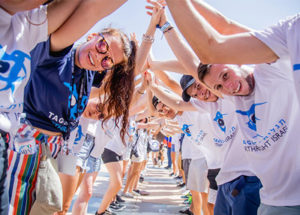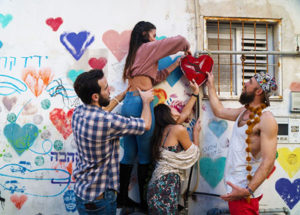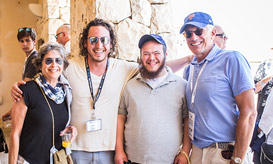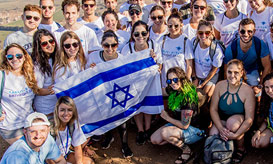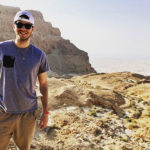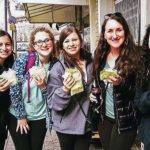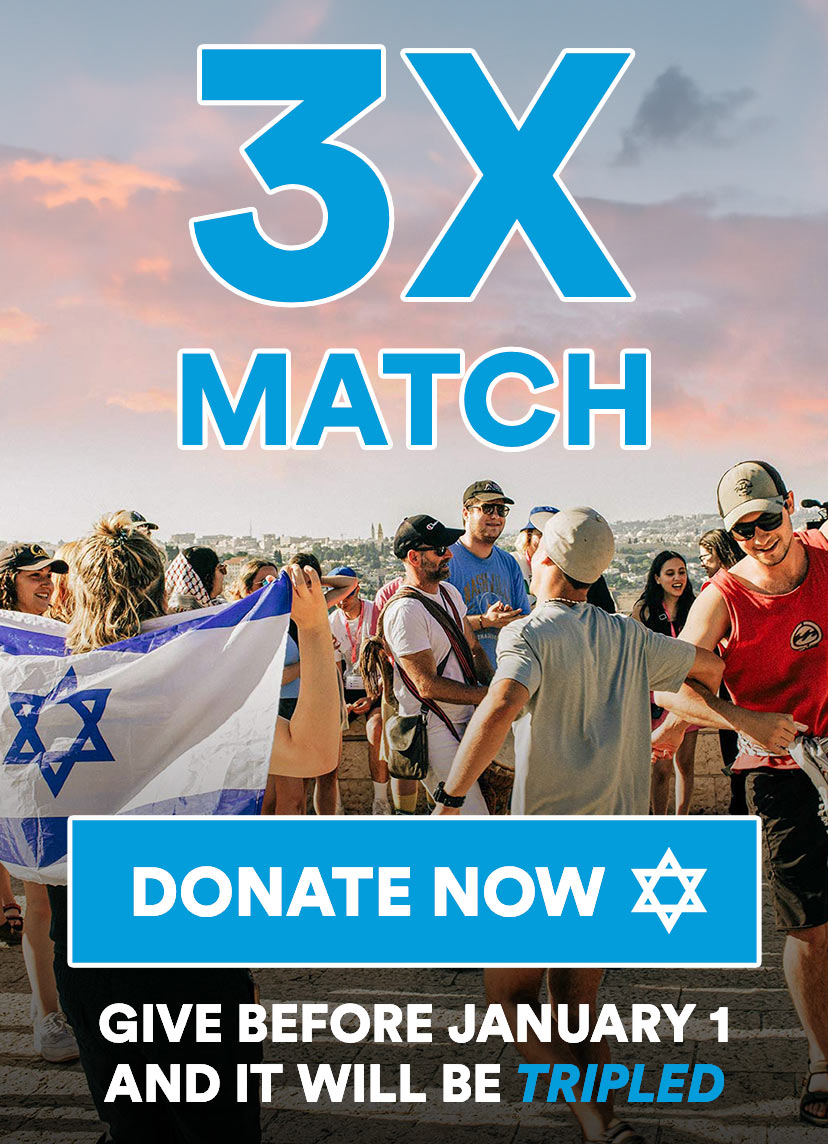Like so many young Jewish adults, I was raised in a mixed-faith family. With my mother…
Growing up, I went to Sunday school every Sunday until I was 16. For a time, I was even at the synagogue on a weekday evening after soccer practice for Hebrew/religious school as well. At a young age, I felt connected to my Jewish identity; I loved the songs, the prayers, the food (other than maror), the holidays, and the community.
However, as I grew older, I felt more and more skeptical of the institutional religious aspect of Judaism and less and less connected with the temple. I still felt being Jewish was an integral part to who I was, but it no longer took the form of being a part of the temple or a youth group. After I was confirmed at 16, I only went to services with my family at the High Holidays and lost touch with my Jewish friends. Externally, being Jewish was conversation with family and being the one to answer questions that my non-Jewish friends had the rare times they came up.
Internally, it meant that I identified with the minority peoples of the world but on the outside looked like the American majority, a strange feeling. However on Birthright Israel, I felt incredibly connected to the group around me. A feeling I attribute to being comfortable talking about and being Jewish, something I didn’t realize I was uncomfortable with until I was in a country and amid a group where the overwhelming majority was like me.
I grew up in the suburbs of Chicago, went to college out in Ohio where I was a history major, came back after school and now live in Avondale, a historically Mexican/Polish neighborhood in Chicago. Learning about the different peoples and places of the world has always been interesting and important to me and although I lost touch with the Jewish community. I always knew I would take advantage of the offer Birthright Israel provides. Who could pass up a heavily subsidized trip to Israel? I definitely couldn’t.
My younger sister and I had talked about going together and so I waited until she was of age to go, then started doing research on what trips were available. What immediately jumped out was a trip with an extra international component, a joint trip between Jews in Argentina and Jews in the United States. My sister and I both speak Spanish and this was a chance to combine two parts of our identities into one. We also invited our cousin to go with us! We were close with him when we were younger, but only really saw him once or twice a year at family events and wanted to see if he was interested in joining us for a once in a lifetime experience. I am very grateful that he did, as it was a wonderful time spending an international trip connecting with each other and our identities as Jews.
Arriving In Israel – Let The Icebreakers Begin
Once we arrived in Israel with our other U.S. group members we met the Israelis and the Argentinians. In the airport it was a little strange, as we did some icebreakers led by our fantastic group leaders, which can be awkward when there aren’t a lot of outspoken, extroverted people involved. However, the moment we got on the bus to Tiberias conversation broke out and people from across the world made connections.
Our trip was somewhat unique in that we arrived in Israel on a Thursday night, spent Friday during the day in Tzfat, and then celebrated Shabbat at our hotel in Tiberias. This is the moment I identify where I felt connected to the others in my group and we became a little Birthright Israel family. Americans, Argentinians, and Israelis were all locked down together with no distractions and we spent that 24 hours in each other’s company, getting to know each other intimately. We had personal conversations about culture, spirituality and religion, politics and economics. We played games with each other without the outside world interfering or fear of judgment. I am normally a pretty reserved, introverted person, but this group of people was one where I felt completely comfortable sharing my thoughts, opinions, and knowledge. I was secure in the fact that even if others differed with me, we were connected because of our Jewish identities. This was not something I had ever experienced before and haven’t since, although once coronavirus restrictions are lifted I will seek out a space where I can feel this way again.
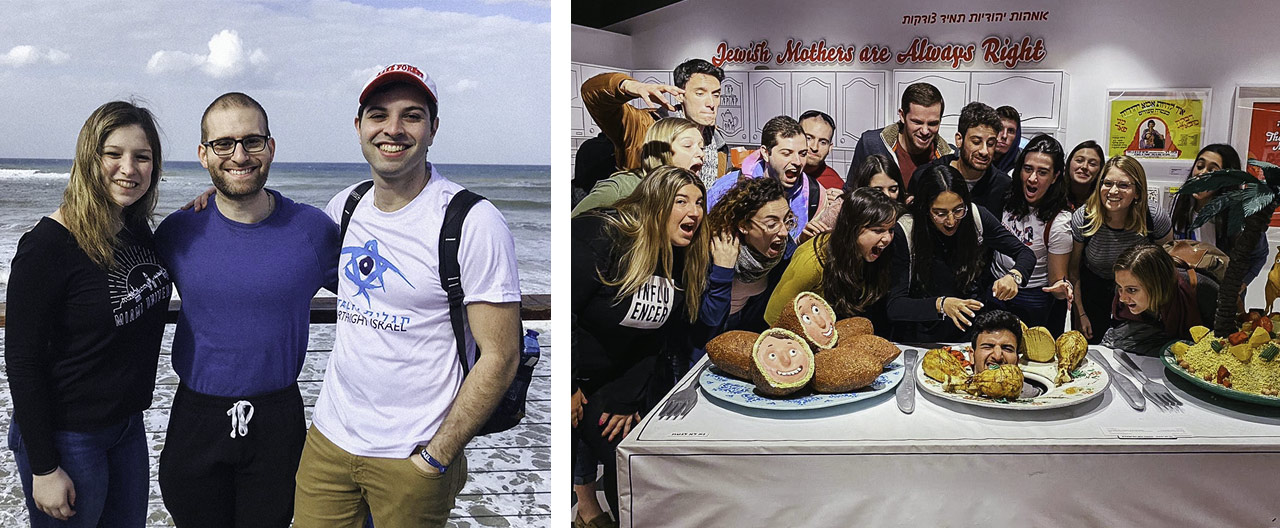
Discovering Modern Israel
After that Shabbat, the week was a whirlwind of travelling and activities. We went all over the northern half of the country, from the northern tip down the western coast, through Tel Aviv, into the Negev, and back up to Jerusalem. One thing that subverted my preconceived notions of Israel was how MODERN it was. In my head, Israel was a place of history, of the Torah and the Crusades, of the 1948 and 1973 wars, not as a modern nation-state living in 2020.
What I found was a thriving country, marked by its status as a high tech state and not nearly as brown as I imagined. Walking through the streets of Tel Aviv didn’t feel very different from Chicago; there were trendy restaurants and foods from other countries, lots of retail and service-based shops, and people everywhere using smartphones instead of looking in front of them as they walked. Our group attended a lecture on Israel’s startup culture that took place in a high rise building with a view over the city, where we learned about the prominence of the tech industry in Israel.
Our time spent in the Negev and the Old City of Jerusalem was more in line with what I had thought of Israel and although it was strange that Jerusalem’s streets were empty on Shabbat as we walked to the Old City, the walk itself was on paved streets passing by governmental buildings, parks with baseball diamonds and soccer nets, and residential neighborhoods that wouldn’t be out of place in the States.
We Maybe From Different Countries But We Are All Jewish
Mixing Spanish, English, and Hebrew (English was the main method of communication), we developed group jokes and hung out as family would. Most of the time in large groups, subgroups develop that don’t tend to mix and mingle with the others. Although there were subgroups that formed, including the easy one I had with my sister and cousin, we weren’t cliquey and everyone spent time with each other. During our travels, I had a conversation with each and every one of the group members, which is very much out of the norm for me and indicative of the relationships formed. They weren’t always heavy conversations about Judaism or politics; sometimes they were about TV, sports, music and other daily life topics. We all learned from each other about our different countries and cultures and although some were more and some were less involved with their Jewish identities growing up, underlying all of this was the connection of having heard the same songs, eaten the same foods, and heard the same basic prayers all our lives.
While in Israel and still affected by the strong emotions of feeling included in the international Jewish community, I resolved to come back and become more involved as an adult. Unfortunately due to coronavirus, I haven’t joined a synagogue for that in-person community, but I’ve incorporated my Jewish identity more outwardly in other ways. My best friends aren’t Jewish and prior to the trip I rarely brought it up, not because I was afraid of their reactions or judgments, but because it wasn’t a huge strong part of my life. Since, I have had conversations with them about spiritual beliefs, identity, and culture without feeling like my thoughts and opinions didn’t matter.

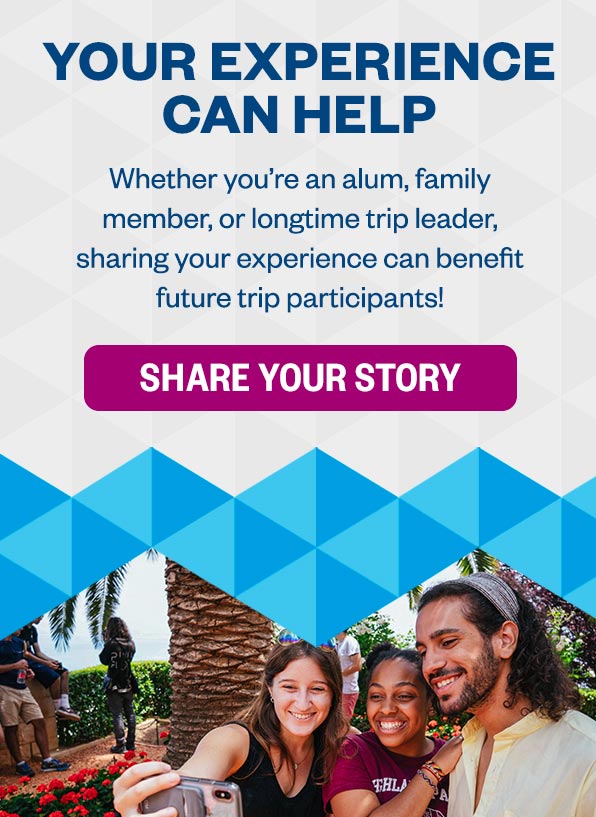
Staying Connected Even During A Pandemic
Just before I left for Israel, I met a Jewish girl in Chicago and we hit it off. Throughout the trip, we stayed in touch and it was good to have someone to share the experience with who had already been on a Birthright Israel trip. After returning home, I went to visit her in Miami and we began to date just before quarantine hit. She joined me for quarantine and while she was with me, we began to have Shabbat dinners with my friends and family. Since she returned, we continued our Shabbats virtually. What I felt about Shabbat in Israel was that it was a time to be with those who are close to you without feeling the pressure of the outside world. It’s a slowing down to express appreciation and gratitude and enjoy those you love. For some it is religious, but for me it’s a time to cook good food and enjoy good company and I am glad to have incorporated that into my life.
It’s been six months, but our Birthright Israel group chat is still alive and kicking on WhatsApp. What that means to me is that although we are all separated physically, we can remain close and keep up the relationships and connections we built while in Israel. It also means that when the world is open and we can travel, I have friends who are like family to visit in Buenos Aires and back in Israel.
Thank You!
To the donors who make Birthright Israel trips possible, thank you very much for providing this opportunity to see Israel. Prior to the trip, it was not high on my list of countries to travel to other than if I were to go on Birthright Israel, but I’m grateful that I had the chance to go with my relatives and build a new family there. However, I would ask why they chose to donate to Birthright Israel Foundation and to continue to give others the same chance I had to see Israel? I like to know the why behind people’s actions and after my trip. I will continue to advocate to others the importance of going on this journey, but I want to know why others do so as well and possibly learn more from them.
I think an important part of the success of my trip for me was that I waited longer than most to go and had a very different experience because of my age. At 25, I was towards the top end of the program’s age group, although I love that there has been a recent addition for those 27-32. Again, I was incredibly uninformed about the Israel that exists today, but I was comfortable in other aspects of my life and I believe that allowed me to appreciate the trip more deeply than I would have right out of high school.
I absolutely plan on returning to Israel, whether through a program, to visit friends and family, for school, or as a part of other travels and I will tell others to take advantage of the opportunity Birthright Israel provides. It’s a wonderful travel experience with fun activities where I found a community, a family, and became more comfortable in my Jewish identity.

